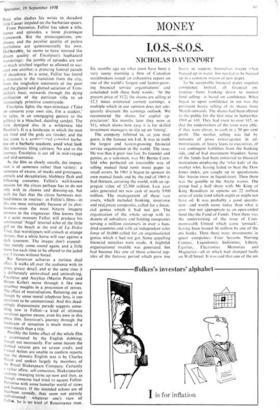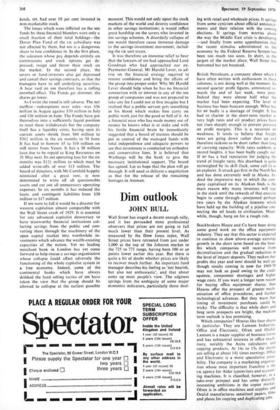MONEY
I.O.S.-S.O.S.
NICHOLAS DAVENPORT
Six months ago on what must have been a very sunny morning a firm of Canadian stockbrokers issued an exhaustive report on one of the world's 'largest and fastest-grow- ing financial service organisations' and concluded with these bold words: 'At the present price of $121 the shares are selling at 12.3 times estimated current earnings, a multiple which in our opinion does not ade- quately discount the earnings outlook. We recommend the shares for capital ap- preciation'. Six months later they were at $11, which shows how easy it is for skilled investment managers to slip up on 'timing'.
The company referred to, as you may guess, is the famous tos Ltd. It was in truth- the largest and fastest-growing financial service organisation in the world. The trou- ble was that it grew too fast. Its founder and genius, as a salesman, was Mr Bernie Corn- feld who perfected an irresistible way of selling mutual fund (unit trust) paper to small savers. In 1961 it began to sponsor its own mutual funds and by the end of 1969 it had thirteen, covering the world, with an ag- gregate value of $2.380 million. Last year sales generated net new cash of nearly $900 million. The management of these vast assets, which included banking, insurance and reaLestate companies, called for a finan- cial genius which it had not got. The organisation of the whole set-up with its dozens of subsidiary and holding companies serving a million customers in over a hun- dred countries and with an independent sales force of 16,000 called for an organisational genius which it had not got. Some appalling financial mistakes were made. A frightful organisational muddle was generated. los had become like one of those colossal rep- tiles of the Jurassic period which grew too
heavy to support themselves except when buoyed up in water. los needed to be buoyed up in a constant stream of new paper.
To be acceptable financial paper requires confidence. Indeed. all financial en- terprise—from banking down to mutual fund selling—is based on confidence. What began to upset confidence in los was the persistent heavy selling of its shares from March onwards. The shares had been offered to the public for the first time in September 1969 ut $10. They had risen to over $15. so that the underwriters of the issue were able. if they were clever, to cash in a 50 per cent profit. The market selling was fed by rumours of gross extravagance in ad- ministration, of heavy loans to executives, of vast contingent liabilities from the banking side, and of bad investment blunders. Some of the funds had been entrusted to financial institutions employing the 'whiz kids' of the market who, having failed to beat the Dow Jones index, got caught up in speculations like Austin (now in liquidation). Then there was the gamble in the Arctic wastes. The group had a half share with Mr King of King Resources in options on 22 million acres of arctic land which might or might not have oil. It was probably a good specula- tion—and worth more today than what it cost—but not appropriate to an open-ended fund like the Fund of Funds. Then there was the underwriting of the issue of Com- monwealth United which came 'unstuck', having been loaned $6 million by one of the tos banks. Then there were investments in queer companies—Four Seasons Nursing Centres, Liquidonics Industries, Liberty Equities, Electronics Memories and Magnetics—all of which had slumped badly on Wall Street. It was said that one of the los
ffolkes's investors' alphabet I is for inflation
funds, trr, had over 10 per cent invested in non-marketable stock.
The losses which were inflicted on the tos funds by these financial blunders were only a small fraction of their total holdings—the Dover Plan Fund of the UK subsidiary was not affected by them, but los is a dangerous share to lose confidence in. In The first place, the salesmen whose pay depends entirely on commissions and stock options get de- pressed, resign and throw their stock on the market. In the second place, the savers or fund-investors also get depressed and cancel their savings contracts, so that the managers have to sell underlying securities. A bear raid on tos therefore has a rolling snowball-effect. The Funds get slimmer; the shares go lower.
As I write the trend is still adverse. The net outflow—redemptions over sales—was $36 million in August against $30 million in July and $36 million in June. The Funds have got themselves into a sufficiently liquid position to. meet these withdrawals but the company itself has a liquidity crisis, having seen its current assets shrink from. $60 million to $364 million in the six months to 30 June. It has had to borrow $5 to $10 million on stiff terms from Vesco. It has a $8 million loan due to be repaid to King Resources on 31 May next. Its net operating loss for the six months was $124 million to which must be added write-offs of over $13 million. The board of directors, with Mr Cornfeld happily reinstated after a great row, is now determined to write off all questionable assets and cut out all unnecessary operating expenses. In six months it has reduced the loans and contingent liabilities from $30 million to $17 million.
If tos were to fall it would be a disaster for western capitalism almost comparable with the Wall Street crash of 1929. It is essential for any advanced capitalist democracy to have trustworthy financial institutions col- lecting savings from the public and con- verting them through the machinery of the open capital market into worthwhile in- vestments which advance the wealth-creating capacities of the nation. Yet no leading merchant bank in London has yet come forward to help rescue a savings organisation whose collapse Could affect adversely the functioning of the whole capitalist system in a free economy. Indeed, some of the continental banks which have always disliked the hard selling tactics of ms have taken the view that the group should be allowed to collapse at the earliest possible moment. This would not only upset the stock markets of the world and destroy confidence in other savings institutions; it would inflict great hardship on the savers who invested in los savings schemes. A disorderly collapse of tos would therefore cause immense damage to the savings-investment movement, includ- ing the Inc unit trusts.
It was therefore an immense relief to hear that the lawyers of los had approached Lord Goodman who had approached our ex- Paymaster-General, Mr Harold Lever, to ad- vise on the financial strategy required to restore confidence and bring the affairs of the group into proper order. Why Mr Harold Lever should help when he has no financial connection with or interest in any of the tos group of companies and was not prepared to take any fee I could not at first imagine but I realised that a public servant gets something in his blood which makes him carry on public work just for the good or hell of it. As a financial man who has made money out of money he knows what is at stake and with his fertile financial brain he immediately suggested that a board of trustees should be put in control of the managed funds with total independence and adequate powers to see that investment is conducted on orthodox and conservative lines. It is believed that Warburgs will be the bank to give the necessary institutional support. The board has agreed. Let us hope that the plan will go through. It will need as delicate a negotiation as that for the release of the remaining hostages in Amman.



































 Previous page
Previous page